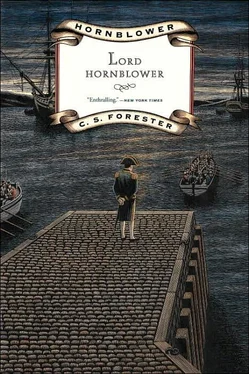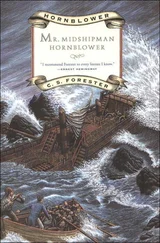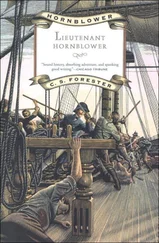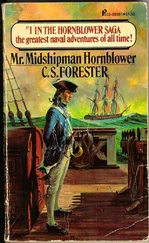Cecil Forester - Lord Hornblower
Здесь есть возможность читать онлайн «Cecil Forester - Lord Hornblower» весь текст электронной книги совершенно бесплатно (целиком полную версию без сокращений). В некоторых случаях можно слушать аудио, скачать через торрент в формате fb2 и присутствует краткое содержание. Год выпуска: 1989, ISBN: 1989, Издательство: Little, Brown & Company, Жанр: Исторические приключения, Путешествия и география, Морские приключения, на английском языке. Описание произведения, (предисловие) а так же отзывы посетителей доступны на портале библиотеки ЛибКат.
- Название:Lord Hornblower
- Автор:
- Издательство:Little, Brown & Company
- Жанр:
- Год:1989
- ISBN:0316289434
- Рейтинг книги:5 / 5. Голосов: 1
-
Избранное:Добавить в избранное
- Отзывы:
-
Ваша оценка:
- 100
- 1
- 2
- 3
- 4
- 5
Lord Hornblower: краткое содержание, описание и аннотация
Предлагаем к чтению аннотацию, описание, краткое содержание или предисловие (зависит от того, что написал сам автор книги «Lord Hornblower»). Если вы не нашли необходимую информацию о книге — напишите в комментариях, мы постараемся отыскать её.
Lord Hornblower — читать онлайн бесплатно полную книгу (весь текст) целиком
Ниже представлен текст книги, разбитый по страницам. Система сохранения места последней прочитанной страницы, позволяет с удобством читать онлайн бесплатно книгу «Lord Hornblower», без необходимости каждый раз заново искать на чём Вы остановились. Поставьте закладку, и сможете в любой момент перейти на страницу, на которой закончили чтение.
Интервал:
Закладка:
The Porta Coeli went smartly about, and reached to the north westward, close-hauled to the southwesterly wind.
“The tide starts to make about now, Sir Horatio,” said Freeman, beside him.
“Thank you.”
That was an additional bit of data in the problem of the morrow which was not yet fully revealed to him. War was as unlike spherical trigonometry as anything could be, thought Horablower, grinning at the inconsequence of his thoughts. Often one approached a problem in war without knowing what it was one wanted to achieve, to prove, or construct, and without even knowing fully what means were available for doing it. War was generally a matter of slipshod, makeshift, hit-or-miss extemporisation. Even if it were not murderous and wasteful it would still be no trade for a man who enjoyed logic. Yet maybe he was taking too flattering a view of himself; maybe some other officer—Cochrane, say, or Lidyard—would, if in his position, already have a plan worked out for dealing with the mutineers, a plan that could not fail to bring satisfactory results.
Four bells rang out sharply; they had been over half an hour on this tack.
“Kindly go about on the other tack, Mr. Freeman. I don’t want to get too far from land.”
“Aye aye, sir.”
If it was not for the war, no captain in his senses would dream for a moment of plunging about in the darkness on this shoal coast, especially when he was extremely doubtful of his exact position—their present estimate was the sum of a series of guesses, guesses about the leeway made while hove-to, guesses at the effects of the tides, guesses at the correspondence between soundings taken overside and soundings marked on the chart.
“What do you think the mutineers will do, sir, when they sight us?” asked Freeman.
The fact that Hornblower had unbent enough to give an explanation of why he wanted to go about must have encouraged Freeman to this familiarity; Hornblower was irritated, but most of all because he had no thoughts on the matter.
“There’s no profit in asking questions which time will surely answer, Mr. Freeman,” he said, tartly.
“Yet speculation is a fascinating thing, Sir Horatio,” replied Freeman, so unabashed that Hornblower stared at him in the darkness. Bush, if Hornblower had spoken to him in that fashion, would have retired wounded into his shell.
“You may indulge yourself in it if you so desire, Mr. Freeman. I have no intention of doing so.”
“Thank you, Sir Horatio.”
Now was there, or was there not, a hint of mockery behind the hint of subservience in that reply? Was it possible that Freeman could actually be smiling inwardly at his superior officer? If so, he was running a fearful risk; a suggestion of dissatisfaction in Hornblower’s future report to the Admiralty would put Freeman on the beach for life. But Hornblower knew, the moment the thought came into his head, that he would do no such thing. He could never blast an able man’s career just because that man had not treated him with slavish respect.
“Water’s shoaling fast, sir,” said Freeman, suddenly—both he and Hornblower had subconsciously been listening to the cry of the leadsman in the chains. “I should like to go about again.”
“Certainly, Mr. Freeman,” said Hornblower, formally.
They were creeping round Cape de la Hève, the northerly point of the Seine estuary, just within which lies Le Havre. There was a chance, a tiny one, that they might find themselves at dawn both to leeward of the Flame and between her and France so that she would have no means of escape at all. And the night was wearing on; it would not be long now before daylight.
“You have a good man at the masthead, Mr. Freeman?”
“Yes, Sir Horatio.”
He would have to tell the hands about the mission on which they had been sent, even though that meant violating the secrecy surrounding the mutiny. Normally there would be little enough need to confide in the hands; British seamen, fatalistic after twenty years of war, would fire into Frenchmen or Americans or Dutchmen without much thought about the rights or wrongs; but to ask them to fight against a sister-ship, to fire into a British vessel, which might, for all he knew, still be wearing her commissioning pendant and her White Ensign, might cause hesitation if he called upon them to do so without some preliminary warning. A careful officer would in ordinary circumstances never breathe the word ‘mutiny’ to his men; no lion-tamer would ever remind the lion that the lion was stronger than he. It was almost daylight.
“Would you be so good as to turn up the hands, Mr. Freeman? I wish to address them.”
“Aye aye, sir.”
The pipes wailed through the brig, and the watch below came streaming up through the hatchway, pouring sleepily aft; the poor devils were losing an hour of sleep because of the inconsiderate way in which dawn did not correspond with the end of the watch. Hornblower looked round for some point of vantage from which he could address them; in a flush-decked vessel like the Porta Coeli he had not the advantage of speaking down into a waist from a quarterdeck. He swung himself up onto the weather bulwark, balancing himself with a hand on the mainbackstay.
“Men,” he said, “are you wondering what has sent you out here?”
Maybe they were, but the rather sleepy, apathetic, breakfastless lines before him showed little sign of it.
“Are you wondering what has sent me out to sea with you?”
By God, they were wondering that. There must have been speculation on the lower deck as to why a full commodore—and not only a commodore, but Hornblower of the legendary past—should have been sent to sea in a mere eighteen-gun brig. It was flattering to see a movement of interest in the lines, a lifting of heads, even while Hornblower cursed at fate for having to make use of rhetorical tricks, and more for having to exploit his own personal renown.
“There is villainy afloat,” said Hornblower. “British seamen have disgraced themselves. They have mutinied in the very presence of the enemy.”
He had the men’s interest now, without a doubt. He had said the word ‘mutiny’ to these slaves of the lash and the whistle. Mutiny, the remedy for all their ills, which would give them freedom from the hardship of their lives, the cruelty and the danger, the foul food and the severance from all the amenities of life. One crew had mutinied. Why should not they do so too? He would have to tell them about the Flame, remind them that close at hand lay the shores of France, where Bonaparte would gladly heap wealth and luxury upon any British seaman who brought a British ship of war over to him. Hornblower let a note of contempt creep into his voice.
“The crew of the Flame, our own sister-ship, has done this thing. Now they are sheltering here in this very bay of the Seine. Every man’s hand is against them. The French have no use for mutineers, and it is our mission to dig these rats from their holes. They have betrayed England, forgotten their duty to King and Country. I expect most of them are honest but stupid, led astray by a few designing villains. It is those villains who must pay the price of their villainy, and we must see they have no chance of escape. If they are mad enough to offer fight, then we must fight them. If they surrender without bloodshed, that fact will be remembered in their favour when they are brought to trial. I want no bloodshed if I can help it—you know as well as I do that a cannon-shot will kill a man without stopping to ask whether he is a villain or just a fool. But if they want bloodshed, then we shall let them have it.”
Hornblower ended his speech, and looked over to Freeman to dismiss the men. It was a cheerless business making a speech to hungry men in a grey dawn, but Hornblower, darting glances at the men as they went about their business, saw that there was nothing to fear from the ship’s company. They were buzzing with talk, of course, but news of mutiny would set any crew a-buzz, just as a village would be set a-buzz by news of a local murder. But it was only gossipy talk, he could see; the men were not making any deductions from the news. He had presented the case to them in such a way as to make it obvious to them that he expected them to obey his orders for dealing with the mutineers, and he had let no hint creep into his speech of his fear that they should be tempted to follow their example. That had not occurred to them yet—but it might, if they were allowed to ruminate over it. He must see that they were kept busy; the ordinary ship’s routine was attending to that at the moment, for they were at work on the opening business of every naval day, washing down the decks before being piped to breakfast.
Читать дальшеИнтервал:
Закладка:
Похожие книги на «Lord Hornblower»
Представляем Вашему вниманию похожие книги на «Lord Hornblower» списком для выбора. Мы отобрали схожую по названию и смыслу литературу в надежде предоставить читателям больше вариантов отыскать новые, интересные, ещё непрочитанные произведения.
Обсуждение, отзывы о книге «Lord Hornblower» и просто собственные мнения читателей. Оставьте ваши комментарии, напишите, что Вы думаете о произведении, его смысле или главных героях. Укажите что конкретно понравилось, а что нет, и почему Вы так считаете.









